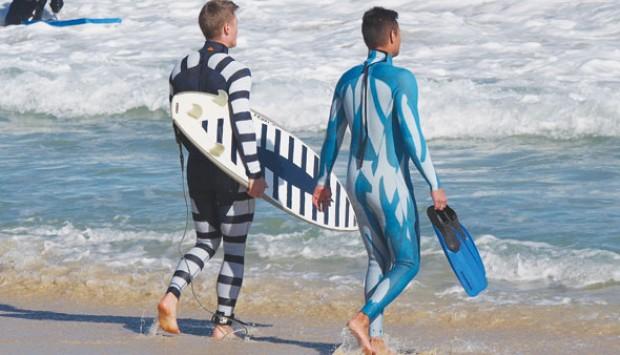The Latest Beach Attire: Anti-Shark Wetsuits
The newest swimwear in Western Australia: anti-shark wetsuits (Photo: SAMS)
If you're a little nervous about sharks, the city were looking for in Thursday's Geo Quiz may not be for you.
They attract plenty of surfers not to mention Tiger sharks, Hammerheads and occasionally Great Whites.
That keeps marine scientists at the University of Western Australia's Ocean Institute very busy studying ways to avert shark attacks.
There are an array of electronic shark mitigation devices being tested but the latest promising technology is what's being called the first anti-shark wetsuit.
So can you name this Western Australian city where researchers are trying to outwit sharks?
Time now to answer this "swimsuit edition" of the Geo Quiz.
The latest swimwear in Western Australia does not feature gorgeous new bikinis.
Instead researchers at the University of Western Australia in Perth teamed up with wetsuit designers to come up with a new design for surfers and snorkelers.
It's called an anti-shark suit.
The suit is designed to confuse a shark's vision and to make whoever is wearing the suit mostly invisible or at least inedible.
The surfers' model features vivid black and white stripes hardly appetizing. Shark attack expert Craig Anderson says the zebra-like pattern is supposed to confuse sharks.
"The most important factor of their senses that they use in the last few seconds before attack is their sight, so the systems that we've developed, the technology we've developed, has created confusion for their sight sense. So that's really what the technology is about."
Another design is intended for scuba divers and snorkelers. It's blue-and-white wavy pattern resembles the ocean water. That's intended to confuse a shark's perceptions of light and exploit their color blindness.
In theory, says designer Hamish Jolly, the wetsuits should keep Jaws away.
"The strategies are two-fold," he says. "One is a 'can't see me' strategy, cryptic in the water, and the other one is a 'can see me but don't eat me' strategy. The idea being that even though you are perceived, you are not perceived as a meal."
To test out the wetsuit designs, researchers used dummy torsos dressed in the anti-shark suits. They say tiger sharks, in the seconds just before they attack, look confused and swim away.
The Indian Ocean waters off Perth are the perfect place to study shark attack mitigation. Five fatal shark attacks in the last two years have put swimmers on alert.
But despite the apparent danger, wetsuit designer Bub Lushey seems to think it's safe to go back into the water.
"In all my time in the wetsuit business, over 20 years, the most common thing we get asked is 'what color do sharks like? I don't want to look like a seal.' Well, now we know the answer to that question and that is pretty exciting."
The wetsuits start at at 400 dollars apiece and they do fit snugly.
